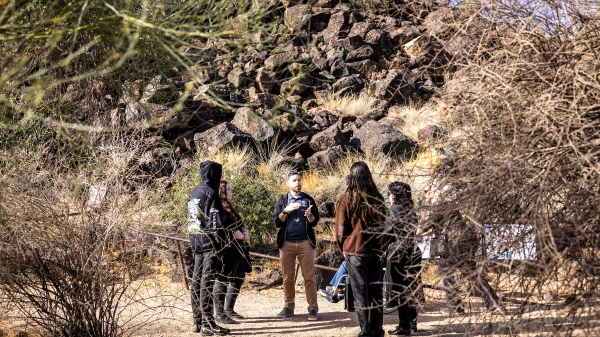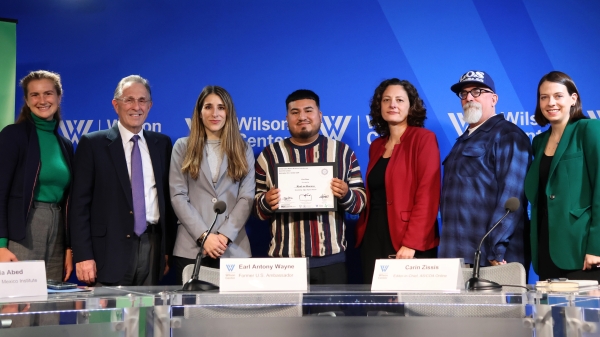Another one in the history books, literally

William Kiser graduated from ASU with his MA in history in 2009 and his PhD in history in 2016.
William Kiser attended Arizona State University from 2009 to 2016. In those seven years, he earned his master’s degree and PhD in history and authored two books: “Dragoons in Apacheland: Conquest and Resistance in Southern New Mexico, 1846-1861” and “Turmoil on the Rio Grande: The Territorial History of the Mesilla Valley, 1846-1865.”
The same year he graduated from the School of Historical, Philosophical and Religious Studies, Kiser was offered a tenure-track position as an assistant professor of history at Texas A&M University. Kiser published his third book while working at the university titled, “Borderlands of Slavery: The Struggle over Captivity and Peonage in the American Southwest.”
His fourth and latest book, “Coast-to-Coast Empire: Manifest Destiny and the New Mexico Borderlands,” focuses on the New Mexico Territory from 1821–1865 and argues that the area was indispensable to U.S. westward expansion.
“Aside from its important geographic position — you couldn’t build a railroad on U.S. soil from Texas to California without going through New Mexico — most Americans had little interest in settlement, mining, farming or other economic pursuits,” Kiser said. “This book pulls together topics and themes from all three of my previous publications, making it more of a synthesis type of work that has broader appeal to general readers.”
His interest in the U.S.-Mexico borderlands during the 19th century goes all the way back to his childhood. He grew up in Las Cruces, New Mexico, a city less than an hour from the countries' shared border.
“I spent a lot of time in my youth visiting regional historic sites with my dad,” Kiser said. “By the third grade, I was reading all the books I could find on the Apaches and the U.S. Army. This initial area of interest evolved during graduate school into a broader focus on 19th-century borderlands.”
Kiser took that same fervor into his studies at ASU where he worked with world renowned scholars such as history Regents’ Professor Donald Fixico. Fixico was Kiser’s dissertation adviser and was impressed by his drive to achieve his career goals.
“Every once in a while, a sui generis young scholar like Billy Kiser comes along who is brilliant, works extremely hard and produces high quality scholarship at an extraordinary pace,” Fixico said. “He is the only scholar that I have ever met in my 40-plus years in academia who within six years from master's to completing the PhD, not only published his first academic book just as he completed his master's degree, but published his second book before he completed his doctoral dissertation, and he publishes award-winning books.”
Kiser shows no signs of slowing down his exploration of borderlands history. He is currently working on his fifth book, which will include research on Civil War diplomacy in the U.S.-Mexico borderlands, spanning the entire border from Tamaulipas, Mexico to Baja, California. The book is under contract with the University of Pennsylvania Press and will be published between 2021 and 2022.
“It takes a transnational approach, focusing mainly on northern Mexico and highlights the irregular and often bizarre ways in which Union and Confederate agents attempted to cut deals with independent-minded Mexican governors, rather than the national government, in order to gain advantages in fighting the Civil War,” Kiser said.
The U.S.-Mexico border has always been a complex region and Kiser believes its history can help us understand today’s modern dilemmas in a political, economic and social sense.
“Major issues in the international borderlands during the 19th century — slave raiding and firearms smuggling are two examples — bear striking similarities to current issues involving undocumented immigration and drug smuggling,” he said.
For students wanting to follow a similar path in academia or history, Kiser has this advice:
“Go as far as possible beyond the basic requirements for your graduate seminar or your advanced degree. It is a very competitive world, especially for new PhDs entering academia and you need every advantage to be competitive on the job market. It is never too early to begin thinking about publishing, because this is what will distinguish you from thousands of other PhDs competing with you for just hundreds of available jobs.”
More Arts, humanities and education

Petroglyph preserve celebrates 30th anniversary with ancient, modern tales
The Deer Valley Petroglyph Preserve provides a beautiful walk through a pristine desert where chuckwalla lizards are as plentiful…

Kaleidoscope short film contest inspires powerful binational filmmaking in its second year
“We come to this country not to steal anybody’s jobs but to take advantage of the opportunities that the rest ignore. We’ve been…

ASU's Neal Lester reflects on life, death of poet Nikki Giovanni
When Neal Lester heard on Monday that poet and activist Nikki Giovanni had died, the news hit hard.Lester, the founding director…